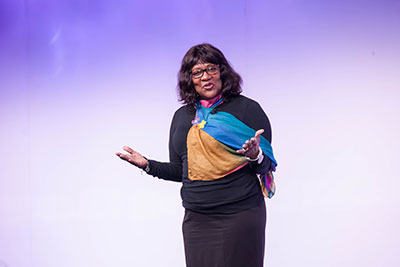
Triple Your Impact This Holiday Season
Triple Your Impact This Holiday Season
Celebrate the holidays with a year-end gift that can go 3x as far to help provide care and support to the millions affected by Alzheimer's disease, and to advance critical research. But please hurry — this 3x Match Challenge ends soon.
Donate NowJacquelyn Patterson has a family history of Alzheimer’s disease. She lost both of her parents and 10 of her aunts to Alzheimer’s and dementia. And she is currently providing care for three of her own sisters who are living with dementia.
Today, Jacquelyn is 66 years old. Her experience with Alzheimer’s started at a young age, but she didn’t start calling the disease by its name until 2008. That was when she became her mother’s full-time caregiver, retiring early from her position as a biology teacher. “This is something that so many members of my family have developed – and we just accepted it,” she recalls.
As a scientist, Jacquelyn has always had a natural curiosity about research, but she didn’t know much about Alzheimer’s disease. “I thought to myself, ‘If I, as a scientist, don’t know much about Alzheimer’s, then who else doesn’t know?’ How many caregivers in our community feel helpless and alone, just as I did?”
Eight years ago, Jacquelyn called the Alzheimer’s Association 24/7 Helpline for the first time. “I will never forget that call; the person who answered was so calm and helpful. I thought: ‘Why didn’t I call sooner?’ I called many times after that. And the Alzheimer’s Association was always there for me, every single time.”
 Jacquelyn began volunteering with the Association, meeting with physicians serving rural and minority populations, sharing information about the importance of early detection and diagnosis and making resources available to those living with the disease.
Jacquelyn began volunteering with the Association, meeting with physicians serving rural and minority populations, sharing information about the importance of early detection and diagnosis and making resources available to those living with the disease.
African Americans are vastly underrepresented in clinical trials, and this limits what Alzheimer’s and dementia researchers can learn. Aiming to overcome the stigma attached to such research, Jacquelyn is currently enrolled in a clinical trial.
“In my community, we don’t talk openly about dementia. I knew based on my teaching experience that African Americans are much less likely to participate in research and I understand the reasons why. But I needed to do something. I needed to commit myself to sharing what I can about dementia to help more people.”
Jacquelyn has come a long way from “accepting” the disease as her family’s destiny. Today, she is learning, teaching and fighting for them. “We need to encourage participation in research that can help us understand the reasons behind the disease. I now look at Alzheimer’s as a disease that can be cured.”
Since her mother’s diagnosis, Jacquelyn has earned a Master’s degree in Public Health and is working towards a Doctorate of Public Health.
Related Articles

The first survivor of Alzheimer's is out there, but we won't get there without you.
Donate Now
Learn how Alzheimer’s disease affects the brain.
Take the Brain Tour
